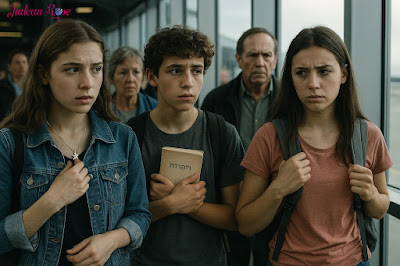An incident from 2022 shows that she is profoundly unqualified for the job.
In May 2022, Waleed Shahid, then communications director for Justice Democrats, reacted to a Jewish Insider tweet about pro-Israel political donations by joking: “Wait until you hear what happened next in next week’s ‘Goy Outsider.’”
Jonathan Greenblatt, head of the Anti-Defamation League, publicly called the tweet antisemitic. His point was that antisemitic tropes appear across the political spectrum, including on the radical left, and that this language was inappropriate and insulting.
The response from parts of the progressive Jewish world was swift and furious. A letter signed by dozens of prominent progressive Jews accused Greenblatt of smearing Shahid and falsely equating a “lighthearted joke” with far-right violence (which he did not do.) Others insisted this was a distraction from “real antisemitism.”
That framing is precisely the problem. The offensiveness is not subtle, and it has nothing to do with intent.
The word goy is not a neutral synonym for “non-Jew.” In contemporary usage, Jews themselves often avoid it because it sounds dismissive or contemptuous, even when used casually. Many Jews, myself included, deliberately teach their children to say “non-Jewish person” instead.
When a non-Jew uses goy as a punchline, it almost always carries an implication: this is how Jews really talk about outsiders. That implication feeds directly into long-standing antisemitic tropes about Jewish insularity, insider language, and "Jewish supremacy."
Combine this with a link to an article about Jewish influence in a political campaign, and the trope becomes significantly more dangerous.
If Shahid had said “Gentile Outsider” the joke would not have landed the same way. The choice of goy was the joke. And the joke works only by invoking a stereotype about how Jews supposedly think and speak among themselves. There is a reason the far Right uses the word "goy" so often and ironically refer to themselves that way. For a leftist figure to use the word in the exact same joking way that the neo-Nazis do is not "lighthearted."
You do not need violence, threats, or slurs for something to be antisemitic. Antisemitism has always relied heavily on insinuation, mockery, and claims to secret knowledge about Jews.
Dismissing it as merely a "Dad joke" is missing the point. Humor has always been one of antisemitism’s most effective delivery systems.
Phylisa Wisdom does not seem to understand these basic facts about antisemitism.
In response to criticism of the “Goy Outsider” tweet, Wisdom wrote: “This is not antisemitism from the left.” When challenged, she doubled down with a simple question: “What’s antisemitic about it?”That question is disqualifying.
Someone charged with combating antisemitism should not need this explained. This is not an edge case or a novel controversy. It is a textbook example of how antisemitic tropes function in modern discourse, on both the right and the left.
If you cannot see why a non-Jew publicly using “goy” to comment on Jewish political dynamics is offensive, then you do not understand antisemitism beyond its most extreme, violent forms. And if that is your threshold, you are not qualified to define the problem, let alone fight it.
There is a deeper pattern here that should make Jews uneasy.
In progressive spaces, other minority groups are granted maximal sensitivity. Language that might reinforce stereotypes is scrutinized closely, regardless of intent. Impact matters more than tone.
Jews are treated differently.
Jews are expected to laugh off jokes about insider language, power, and tribalism. When they object, they are told they are oversensitive, divisive, or distracting from “real” problems. Antisemitism is redefined so narrowly that only physical violence counts, while the cultural and rhetorical groundwork that enables that violence is dismissed.
This asymmetry is now embedded in progressive norms - and this incident proved it.
Imagine the furious response from progressive Jews if someone responded to a show on BET saying “Wait until you see next week’s ‘Cracker Entertainment Television.’” There is no difference - but the Jews are expected to laugh when they are the victims of the joke.
This is about competence. If someone cannot recognize why the “Goy Outsider” joke is antisemitic, they do not understand how antisemitism actually works. And someone who does not understand that should not be entrusted with leading the fight against it in New York City.
Antisemitism does not begin with bullets. It begins with permission structures – permission to mock, to insinuate, and to minimize. If you respond to antisemitism by minimizing it, you are not fighting it. You are enabling it.
|
"He's an Anti-Zionist Too!" cartoon book (December 2024) PROTOCOLS: Exposing Modern Antisemitism (February 2022) |
 |

 Elder of Ziyon
Elder of Ziyon



 Buy
Buy .jpg)




























